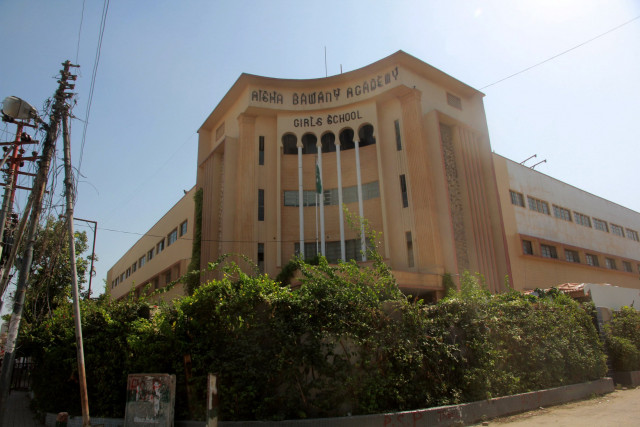Aisha Bawany College: Education dept to ensure academic activities continue smoothly
Court orders trust to rebuild partition wall between college, Ayesha Bawany Academy

The court ordered the opening of the school in order to facilitate the students. PHOTO: ATHAR KHAN/EXPRESS
A two-judge bench, headed by Justice Munib Akhtar, gave these directives while hearing a petition filed by the principal, teachers and parents of the students of Aisha Baway College against the Aisha Bawany Trust for sealing the premises.
Some 2,500 students were barred from attending classes when the college building was sealed on September 16 on the orders of a civil court in a case filed by the trustees of the Aisha Bawany Trust regarding possession of the building.
Aisha Bawany College was taken over by the government under the educational institutions' nationalisation in 1972, during which the lease in respect to its land in favour of the trust had expired.
Upon denationalisation, the trust initiated litigation before the civil court to seek possession of the land. The suit was decreed in favour of the trust, which later moved an application for execution of the judgment and possession of the land.
However, a SHC single bench, headed by Justice Fahim Ahmed Siddiqui, had restrained the civil judge from proceeding with the case. Yet, the trust did not allow classes to resume.
After a three-day protest: Students approach SHC to get Aisha Bawany College reopened
Subsequently, the teachers and parents of the students had filed a petition, pleading to the court to direct the provincial government resolve the dispute with the Aisha Bawany Trust or provide students with alternative place so that they could continue studies.
Taking up the matter on September 22, the SHC division bench had appointed its nazir to get the premises unlocked and handover its possession to the education department so that classes could immediately be restarted.
The nazir and Saddar DSP filed their reports regarding compliance with the court's order. In his report, the nazir stated that he visited the college and found the premises locked, which were unlocked in compliance with the order passed by the court. He said that the possession of the same was handed over to the secretary of the provincial education department, as per the orders of the court.
The judges took the nazir's report on its record. It was informed that a wall that separated the school from the college inside the Aisha Bawany Academy building had been demolished by the trust after they got the premises sealed through the civil judge's order on September 16.
SHC dismisses contempt pleas in Aisha Bawany College case
Meanwhile, advocate Shabbir Ahmed Sheikh filed a power of attorney on behalf of the Aisha Bawany Trust.
The judges directed the trust to ensure the demolished wall was reconstructed at its own expense. It also directed the nazir to personally supervise the construction work.
Barrister Salahuddin Ahmed, who represented the petitioners, argued that due to the dispute between the provincial government and trust over the possession of the college's premises was disrupting the educational activities, thus risking the future of hundreds of the students currently studying at the college.
He said the government had failed to get the dispute with the trust resolved, questioning why the students were being punished for something that was not their fault.
He argued that either the provincial government should get the dispute resolved forever or provide an alternative place where the students could continue with their studies.
Aisha Bawany College to reopen its doors today
Continuing their previous interim order, the two-judges directed all the parties concerned to ensure that Aisha Bawany College will remain open to the students till the final order in the petition. It further directed the secretary education department to ensure the classes were conducted as usual. The hearing was adjourned till October 5.
Case history
The teachers and parents of the students had approached the court on Friday after protesting for five days against the sealing of the college's premises and refusal by the trustees of the Aisha Bawany Trust to reopen the premises despite order of the Sindh High Court.
Their lawyer had argued that as an immediate consequence of the dispute, the entire college and its students had been subject to upheaval and classes had been abruptly discontinued. "This has had, and continues to have, a huge adverse effect on the students who number around 2,500, disturbing and disrupting their education completely," he claimed.
"In the peculiar circumstances of this case it is the students and not the trust that will be adversely affected and suffer irreparable loss and injury," Barrister Ahmed argued. He said that in relation to the non-compliance of the stay order passed by the single-judge bench, a contempt application had also been filed. However, he pleaded that immediate relief was essential since it was stated that each day of education that is lost poses a huge burden on the students.



















COMMENTS
Comments are moderated and generally will be posted if they are on-topic and not abusive.
For more information, please see our Comments FAQ